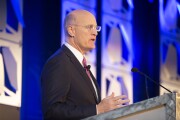
Merrill Lynch's advisor sorrows come not as single spies, but in this case two battalions.
The enormous wirehouse lost an ultrahigh net worth team managing over $1.3 billion of client AUM and a high net worth team managing $340 million AUM to Swiss rival UBS Friday, according to a person familiar with the matter. Together, the four advisors target the very two wealth segments that
Both teams also offer expertise on estate planning and retirement, reflecting UBS's interest in prioritizing this service as a massive intergenerational wealth transfer begins. In October, UBS
The move comes as UBS aims to
As part of that push, last fall
Both advisor teams declined to interview for this story.
A pair of Lehman veterans
The first team of the haul, the Klinger Quan Group, is co-headed by private wealth advisors Jeffrey Klinger and Bradley Quan in San Francisco, according to a
Klinger began his career as an investment banker at Burnham Securities. He then became a vice president of private wealth management at Lehman Brothers. Shortly after the once-mighty investment bank
Quan appears to have moved with Klinger among these firms, suggesting a long working relationship between the advisors that predates their time at Merrill and has developed as they both moved into private wealth careers. Quan started at Lehman Brothers in 2003 as a business analyst, the press release states, and became a relationship manager in private wealth management at Credit Suisse. His
Klinger offers comprehensive goal-based advice to clients, according to the press release. In addition, "Jeff has spent more than 17 years focused on equities, fixed income, alternative investments, corporate executive services, stock options, 10b5-1 plans, concentrated equity positions, hedging and monetization," his
Quan specializes in offering tax solutions, trust and estate planning services and retirement planning. In addition, he "has particular knowledge in developing long-term frameworks designed to help preserve capital and generate cash flow, while mitigating risk," the press release states.
The group's BrokerCheck records show they were actively registered with UBS as of Jan. 20, although their move was publicly announced a week later.
A family-focused office
The second group, consisting of financial advisors David Sacharko and Sean Siana, is based in Hartford, Connecticut, and focuses on serving high net worth individuals and families with an emphasis on estate planning, retirement and intergenerational wealth transfer, according to a
Sacharko began his career as a broker at Merrill in 2004, according to his
Siana, who is a certified financial planner, began working in 2012 as a banker at the former U.S. Trust — now Bank of America Private Bank — according to the press release. He moved to Merrill in 2015, according to his
Siana "focuses on providing high net worth clients with personalized wealth planning advice, including trust and estate planning services, investment and retirement planning, and liquidity planning," the press release states.
They will report to the UBS Greater New England Market, led by William Cholawa and Weisner Perez.
"David and Sean are experienced advisors who are well-versed in navigating family dynamics, which helps them provide clients with comprehensive plans for the accumulation, retention and transfer of wealth," Cholawa said in a press release.
Taking losses in stride
Merrill president
"Over half of the people who left Merrill Lynch last year were individuals who had come to Merrill Lynch on a recruiting deal nine or 10 years earlier," Sieg said, adding that when their deal at Merrill expired, such individuals immediately took another deal somewhere else.
"I'm not saying anything about that is untoward, but I think what that says is, this is an advisor who's made a decision that over the course of their career, they're going to move firm to firm. And that is a part of their personal strategy for maximizing their success."
Sieg acknowledged that "people leave firms for lots of different reasons," though. "Some of them are anchored in legitimate business strategy concerns."







